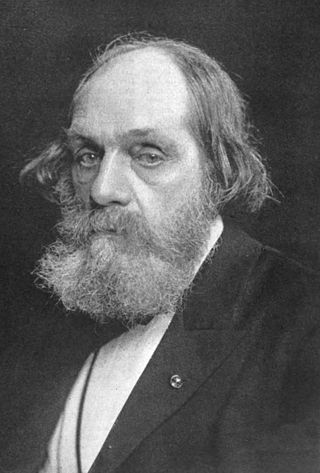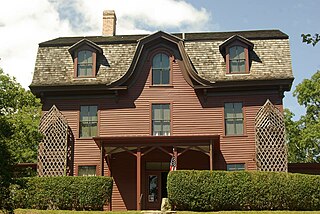Related Research Articles

Edward Everett was an American politician, Unitarian pastor, educator, diplomat, and orator from Massachusetts. Everett, as a Whig, served as U.S. representative, U.S. senator, the 15th governor of Massachusetts, minister to Great Britain, and United States secretary of state. He also taught at Harvard University and served as its president.

Sir Wilfred Thomason Grenfell was a British medical missionary to Newfoundland, who wrote books on his work and other topics.

Edward Everett Hale was an American author, historian, and Unitarian minister, best known for his writings such as "The Man Without a Country", published in Atlantic Monthly, in support of the Union during the Civil War. He was the grand-nephew of Nathan Hale, the American spy during the Revolutionary War.

St. Anthony is a town on the northern reaches of the Great Northern Peninsula of the Canadian province of Newfoundland and Labrador. St. Anthony serves as a main service centre for northern Newfoundland and southern Labrador. St. Anthony had a population of 2,180 in 2021, compared with 2,258 in 2016, 2,418 in 2011, 2,476 in 2006 and 2,730 in 2001.
The Grenfell Mission was a philanthropic organization that provided medical and social services to people in rural communities of northern Newfoundland and Labrador. It was founded by Sir Wilfred Grenfell in 1892 as a branch of The Royal National Mission to Deep Sea Fishermen based in Britain.

Open Library is an online project intended to create "one web page for every book ever published". Created by Aaron Swartz, Brewster Kahle, Alexis Rossi, Anand Chitipothu, and Rebecca Hargrave Malamud, Open Library is a project of the Internet Archive, a nonprofit organization. It has been funded in part by grants from the California State Library and the Kahle/Austin Foundation. Open Library provides online digital copies in multiple formats, created from images of many public domain, out-of-print, and in-print books.

Tufts Children's Hospital in Boston, Massachusetts was a downtown Boston pediatric hospital owned by Tufts Medical Center, occupying the space between Chinatown and the Boston Theater District, which closed in summer 2022.

Stephen Smith was a New York City surgeon and civic leader who made important contributions to medical education, nursing education, public health, housing improvement, mental health reform, charity oversight, and urban environmentalism. Smith maintained an active medical practice, was an attending physician at Bellevue Hospital for thirty-seven years, and authored three surgical texts, but he was best known for his public service. Three mayors, seven governors, and two U.S. presidents appointed Smith to almost fifty years of public responsibilities. Shortly before Smith's death in 1922, Columbia University President and future Nobel Peace Prize winner Nicholas Murray Butler awarded him the school's highest honor and pronounced Smith, “the most interesting figure in American medicine and in American public service today.” The New York Academy of Medicine initiated the annual Stephen Smith Medal for lifetime achievement in public health in 2005.
Cambridge Health Alliance (CHA) is a healthcare provider in Cambridge, Somerville and Boston's metro-north communities in Massachusetts. CHA offers services including primary care, specialty care, and mental health/substance use services. It includes two acute care hospitals, primary care and specialty practice facilities, and the Cambridge Public Health Department. CHA maintains an affiliation with Beth Israel Deaconess Medical Center in Boston and is a Tufts University School of Medicine and Harvard Medical School teaching affiliate.

Tufts Medical Center, a 15-building campus located in Boston, Massachusetts, is a downtown Boston hospital midway between Chinatown and the Boston Theater District.

Wexham Park Hospital is a large NHS hospital in Slough, Berkshire. It has been managed by Frimley Health NHS Foundation Trust since 2014. Neil Dardis has been the Trust's chief executive since 2018.
Cataldo Ambulance Service and Atlantic Ambulance Service are a private emergency medical services (EMS) provider in the Greater Boston and North Shore areas of the Commonwealth of Massachusetts, licensed at the advanced life support (ALS) level by the Massachusetts Department of Public Health. As of October 2022, Cataldo had 48 ambulances registered with the state, while the Atlantic division had an additional 45. Headquartered in Somerville, Massachusetts, and with base locations throughout the North Shore, Cataldo provides 911 and interfacility transportation (IFT) ambulance service to several communities, hospitals, and nursing facilities in Massachusetts. Cataldo also operates SmartCare, a mobile integrated health (MIH) provider.
The Boston Miscellany of Literature and Fashion was a monthly literary and fashion magazine published in Boston, Massachusetts from 1842 to 1843. It also published book reviews and music.

The Edward Everett Hale House is a historic house at 2625A Commodore Oliver Hazard Perry Highway in South Kingstown, Rhode Island. It was commissioned in 1873 by businessman and historian William B. Weeden and designed by architects C. Maxson & Company of Westerly. Edward Everett Hale used the house as a summer home for himself and his family for several decades from the 1870s to the 1910s. The house and added to the National Register of Historic Places in 2007.

Headquartered in Chautauqua, New York, the International Order of the King's Daughters and Sons is an interdenominational Christian philanthropic organization. Also known as "The King's Daughters and Sons" or "IOKDS," the organization's mission statement is derived from the Bible's Mark 10, verse 45: “Not to be ministered unto, but to minister.” Its stated objective is: "The development of Spiritual Life and Stimulation of Christian Activity."
Herbert Israel Margolis was an American orthodontist who was known for his contributions towards field of Orthodontics. He was the President of American Academy of Dental Science and contributed in developing what is known as Margolis Cephalostat which is used in orthodontic diagnosis. He also developed the ACCO appliance.

Jane "Jennie" Collins (1828–1887) was an American labor reformer, humanitarian, and suffragist. Orphaned as a child, she supported herself at 14 by working in the cotton mills, and later as a domestic and a seamstress. She was active in the abolitionist and labor movements, volunteered in military hospitals during the Civil War, and founded a charity for poor working women in Boston. In 1870, at the invitation of Susan B. Anthony, she addressed the National Woman Suffrage Association convention in Washington. The following year, she became one of the first working-class women in the United States to publish a volume of her own writings: Nature's Aristocracy; Or, Battles and Wounds in Time of Peace. A Plea for the Oppressed.
Harriet Elizabeth Freeman was an American botanist, geologist, conservationist, and letter writer. She collaborated with writer and minister Edward Everett Hale. Letters decoded in the early twenty-first century suggest that the two had a romantic relationship that was covered up by Hale's family and biographers.
The 55th Massachusetts General Court, consisting of the Massachusetts Senate and the Massachusetts House of Representatives, met in 1834 during the governorship of John Davis. Benjamin T. Pickman served as president of the Senate and William B. Calhoun served as speaker of the House.
The 28th Massachusetts General Court, consisting of the Massachusetts Senate and the Massachusetts House of Representatives, met in 1807 and 1808 during the governorship of James Sullivan. Samuel Dana served as president of the Senate and Perez Morton served as speaker of the House.
References
- ↑ "Annual report v.28-30". HathiTrust. Retrieved 2024-11-04.
- ↑ MiFf!in@harvardmag.com (2014-12-15). "Brief life of writer-reformer Edward Everett Hale, by Jeffrey Mifflin | Harvard Magazine". www.harvardmagazine.com. Retrieved 2024-11-22.
- ↑ "MHS Collections Online: Lend a hand leaflet. Vol. 28, no. 2 (Feb. 1937)". www.masshist.org. Retrieved 2024-11-22.
- ↑ "Partnerships". Lend A Hand Society. Retrieved 2024-11-04.
- ↑ "About". Lend A Hand Society. Retrieved 2024-11-04.
- 1 2 "Young people's societies". HathiTrust. Retrieved 2024-11-04.
- ↑ Magazine, Smithsonian; Hammer, Joshua. "The Great Japan Earthquake of 1923". Smithsonian Magazine. Retrieved 2024-11-04.
- 1 2 "Lend a Hand Society Records, 1843-1982". www.masshist.org. Retrieved 2024-11-04.
- ↑ Connor, Jennifer J. (2017-09-01). ""Dispensing Good Books and Literature" to Coastal Communities: The Role of the Grenfell Mission in Newfoundland and Labrador, 1890s–1940". Newfoundland & Labrador Studies. 32 (2). ISSN 1715-1430.
- ↑ "History, season of 1900". HathiTrust. Retrieved 2024-11-04.
- ↑ "Floating Hospital Renamed Tufts Medical Center | Tufts Medicine". www.tuftsmedicine.org. Retrieved 2024-11-04.
- ↑ "Annual report v.28-30". HathiTrust. Retrieved 2024-11-04.
- ↑ "Lend a hand. A record of progress. By Edward E. Hale, D.D. v.10 1893". HathiTrust. Retrieved 2024-11-04.
- ↑ "Lend a Hand Society Records, 1843-1982". www.masshist.org. Retrieved 2024-11-04.
- ↑ "LEND A HAND SOCIETY - GuideStar Profile". www.guidestar.org. Retrieved 2024-12-05.
- ↑ "What We Do". Lend A Hand Society. Retrieved 2024-12-05.
- ↑ "The Boston Foundation announces $1 million in grants to 20 organizations, opens new application period for Safety Net Grants program". www.tbf.org. Retrieved 2024-12-05.
- ↑ "Annual report v.28-30". HathiTrust. Retrieved 2024-12-05.